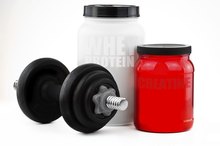What does fact checked mean?
At Healthfully, we strive to deliver objective content that is accurate and up-to-date. Our team periodically reviews articles in order to ensure content quality. The sources cited below consist of evidence from peer-reviewed journals, prominent medical organizations, academic associations, and government data.
- Journal of International Society of Sports Nutrition: The Effects of Whey Protein With or Without Carbohydrates on Resistance Training Adaptation
- Journal of International Society of Sports Nutrition: The Effects of Whey Protein With or Without Carbohydrates on Resistance Training Adaptation
- Nutrition: Long-Term Leucine Supplementation Reduces Fat Mass Gain Without Changing Body Protein Status of Aging Rats
- Nutrition: Long-Term Leucine Supplementation Reduces Fat Mass Gain Without Changing Body Protein Status of Aging Rats
- FamilyDoctor.org: What It Takes to Lose Weight
- Harvard Health Publications: Calories Burned in 30 Minutes for People of Three Different Weights
- American Council on Exercise: Strength Training Pre-Workout Nutrition Guidelines
The information contained on this site is for informational purposes only, and should not be used as a substitute for the advice of a professional health care provider. Please check with the appropriate physician regarding health questions and concerns. Although we strive to deliver accurate and up-to-date information, no guarantee to that effect is made.
Can Super Advanced Whey Protein Help You Lose Body Fat?
When used as part of a strength-training program, whey protein supplements such as Super Advanced Whey Protein may help increase fat loss. You may need to do more than add a supplement to your daily routine, however, if you're also trying to lose fat. You'll also need to change your caloric equation, creating a negative balance by eating less and moving more. Before adding a supplement such as Super Advanced Whey Protein to your eating plan, consult your doctor or a dietitian to help you develop a plan that suits your specific health needs.
Super Advanced Whey Protein Powder
Filled with whey protein, various amino acids and creatine, Super Advanced Whey Protein Powder, made by Body Fortress, is a post-workout recovery supplement. Each scoop contains 170 calories, 7 grams of carbs, 30 grams of protein and 3 grams of fat. The manufacturer suggests mixing one to two scoops of the powder in 6 to 8 ounces of water and drinking it immediately after your workout. Super Advanced Whey Protein powder has to be consumed within 10 minutes of mixing, according to Body Fortress. The supplement is available in a number of different flavors, including chocolate, vanilla, cinnamon swirl and chocolate peanut butter.
- Filled with whey protein, various amino acids and creatine, Super Advanced Whey Protein Powder, made by Body Fortress, is a post-workout recovery supplement.
Whey Protein Supplements and Body Fat
Benefits & Side Effects of HMB
Learn More
By themselves, whey protein supplements may not do much to budge your fat stores, but when you take them as part of a strength-training program, they might help a bit. A 2015 study published in the Journal of the International Society of Sports Nutrition found that supplementing with whey protein after a workout improved abdominal fat loss better than a fast-digesting carb supplement 1.
Leucine, an amino acid found in Super Advanced Whey Protein, may be an important supplement in the battle against fat. A 2012 study published in the journal Nutrition found that supplementation with leucine in rats helped decrease the accumulation of fat while increasing muscle 3. Although this study shows promise for leucine, human studies are necessary before claims can be supported.
- By themselves, whey protein supplements may not do much to budge your fat stores, but when you take them as part of a strength-training program, they might help a bit.
- A 2015 study published in the Journal of the International Society of Sports Nutrition found that supplementing with whey protein after a workout improved abdominal fat loss better than a fast-digesting carb supplement 1.
Use Calories to Lose Fat
Adding Super Advanced Whey Protein to your diet sounds like an easy way to lose fat. But the only tried-and-true way to change your body composition is by eating fewer calories than your body needs, burning more calories with exercise or a combination of both. One pound of fat contains 3,500 calories, so creating a 500-calorie negative balance every day may help you lose 1 pound per week. Create the deficit by cutting out 250 calories, such as swapping your pepperoni pizza at lunch for a cup of chicken noodle soup and side salad, or your ice cream dessert for a bowl of fresh-cut melon. And add aerobic exercise to burn 250 calories, such as 30 minutes on the elliptical machine or a 45-minute low-impact aerobics class.
- Adding Super Advanced Whey Protein to your diet sounds like an easy way to lose fat.
- But the only tried-and-true way to change your body composition is by eating fewer calories than your body needs, burning more calories with exercise or a combination of both.
Whey Protein on Your Fat-Burning Plan
What Is Super Citrimax?
Learn More
Super Advanced Whey Protein Powder can be part of any fat-burning program. But the calories in the supplement count and need to be considered as part of your overall diet. Also, to gain the most benefits, the supplement may work best immediately after your workout, as suggested by the manufacturer. This is the time when your muscles are most ready and able to build. To replenish your energy levels, however, you might want to add some carbs to your whey protein. Ideally, your post-workout meal should have at least a 1-to-1 ratio of carbs to protein, according to the American Council on Exercise 6. Mix your protein powder with nonfat milk or blend it with a banana or strawberries to get the right combination.
- Super Advanced Whey Protein Powder can be part of any fat-burning program.
- To replenish your energy levels, however, you might want to add some carbs to your whey protein.
Related Articles
References
- Journal of International Society of Sports Nutrition: The Effects of Whey Protein With or Without Carbohydrates on Resistance Training Adaptation
- British Journal of Nutrition: Effects of Whey Protein Isolate on Body Composition, Lipids, Insulin and Glucose in Overweight and Obese Individuals
- Nutrition: Long-Term Leucine Supplementation Reduces Fat Mass Gain Without Changing Body Protein Status of Aging Rats
- FamilyDoctor.org: What It Takes to Lose Weight
- Harvard Health Publications: Calories Burned in 30 Minutes for People of Three Different Weights
- American Council on Exercise: Strength Training Pre-Workout Nutrition Guidelines
- Gilbert, J.-A., Bendsen, N. T., Tremblay, A., & Astrup, A. (2011). Effect of proteins from different sources on body composition. Nutrition, Metabolism and Cardiovascular Diseases, 21, B16–B31. DOI: 10.1016/j.numecd.2010.12.008.
- Hulmi, J. J., Lockwood, C. M., & Stout, J. R. (2010). Effect of protein/essential amino acids and resistance training on skeletal muscle hypertrophy: A case for whey protein. Nutrition & Metabolism, 7(1), 51. DOI: 10.1186/1743-7075-7-51.
- Ridge, A., Devine, A., Lyons-wall, P., Conlon, J., & Lo, J. (2018). The impact of whey protein supplementation in older adults on nutrient intakes and satiety over an 11-week exercise intervention. Food Quality and Preference, 68, 72–79. DOI: 10.1016/j.foodqual.2018.01.013.
- Tahavorgar, A., Vafa, M., Shidfar, F., Gohari, M., & Heydari, I. (2014). Whey protein preloads are more beneficial than soy protein preloads in regulating appetite, calorie intake, anthropometry, and body composition of overweight and obese men. Nutrition Research, 34(10), 856–861. DOI: 10.1016/j.nutres.2014.08.015.
- Thomas, D. T., Erdman, K. A., & Burke, L. M. (2016). Position of the Academy of Nutrition and Dietetics, Dietitians of Canada, and the American College of Sports Medicine: Nutrition and Athletic Performance. Journal of the Academy of Nutrition and Dietetics, 116(3), 501–528. DOI: 10.1016/j.jand.2015.12.006.
- Zhu, K., Kerr, D. A., Meng, X., Devine, A., Solah, V., Binns, C. W., & Prince, R. L. (2015). Two-Year Whey Protein Supplementation Did Not Enhance Muscle Mass and Physical Function in Well-Nourished Healthy Older Postmenopausal Women. The Journal of Nutrition, 145(11), 2520–2526. DOI: 10.3945/jn.115.218297.
Writer Bio
Jill Corleone is a registered dietitian and health coach who has been writing and lecturing on diet and health for more than 15 years. Her work has been featured on the Huffington Post, Diabetes Self-Management and in the book "Noninvasive Mechanical Ventilation," edited by John R. Bach, M.D. Corleone holds a Bachelor of Science in nutrition.









